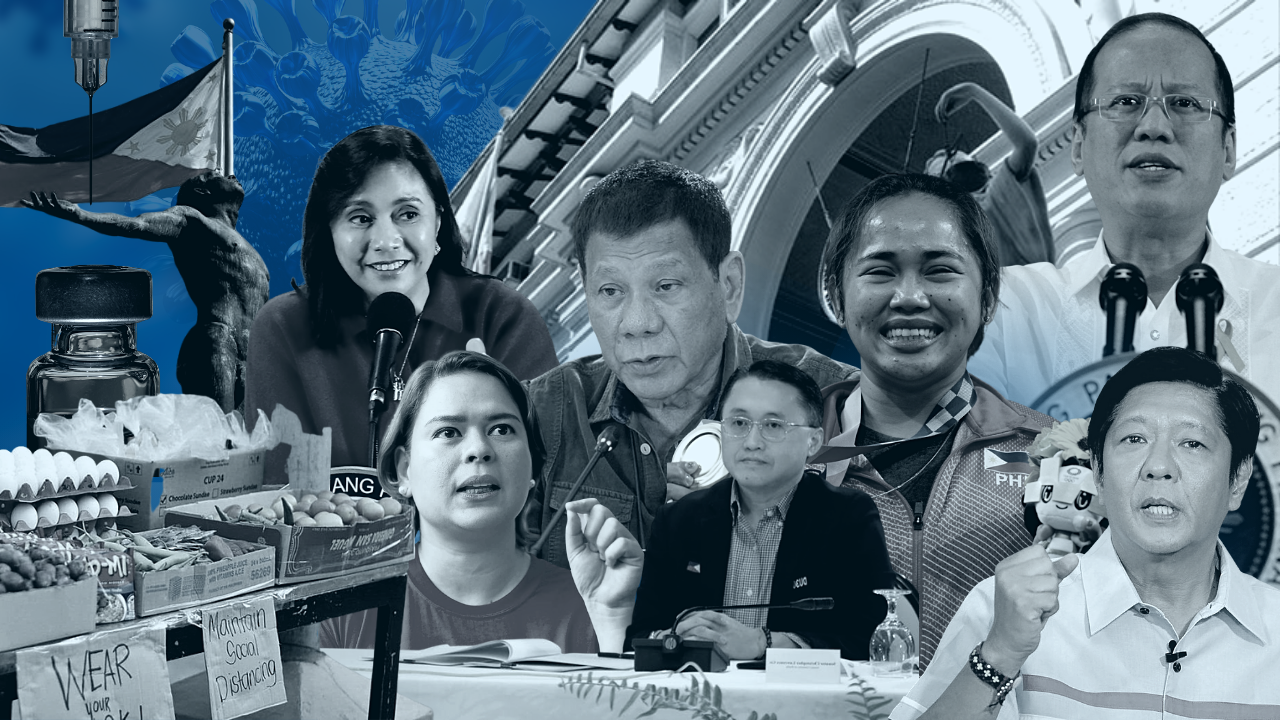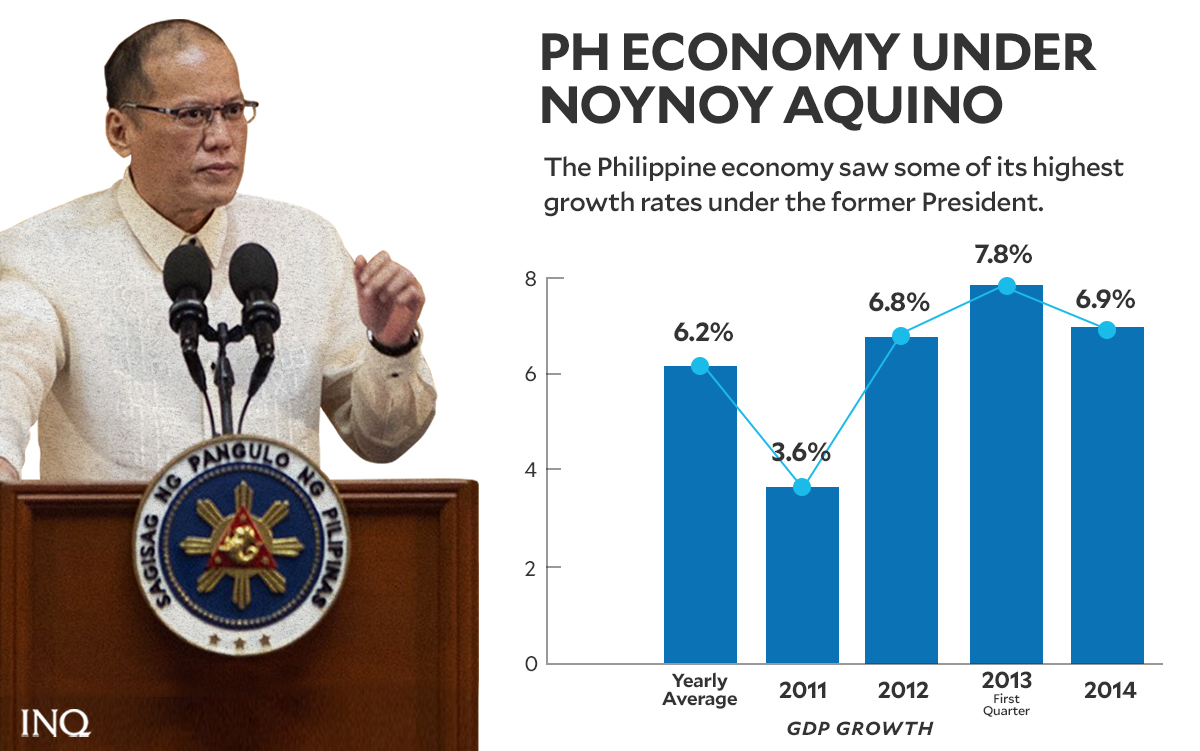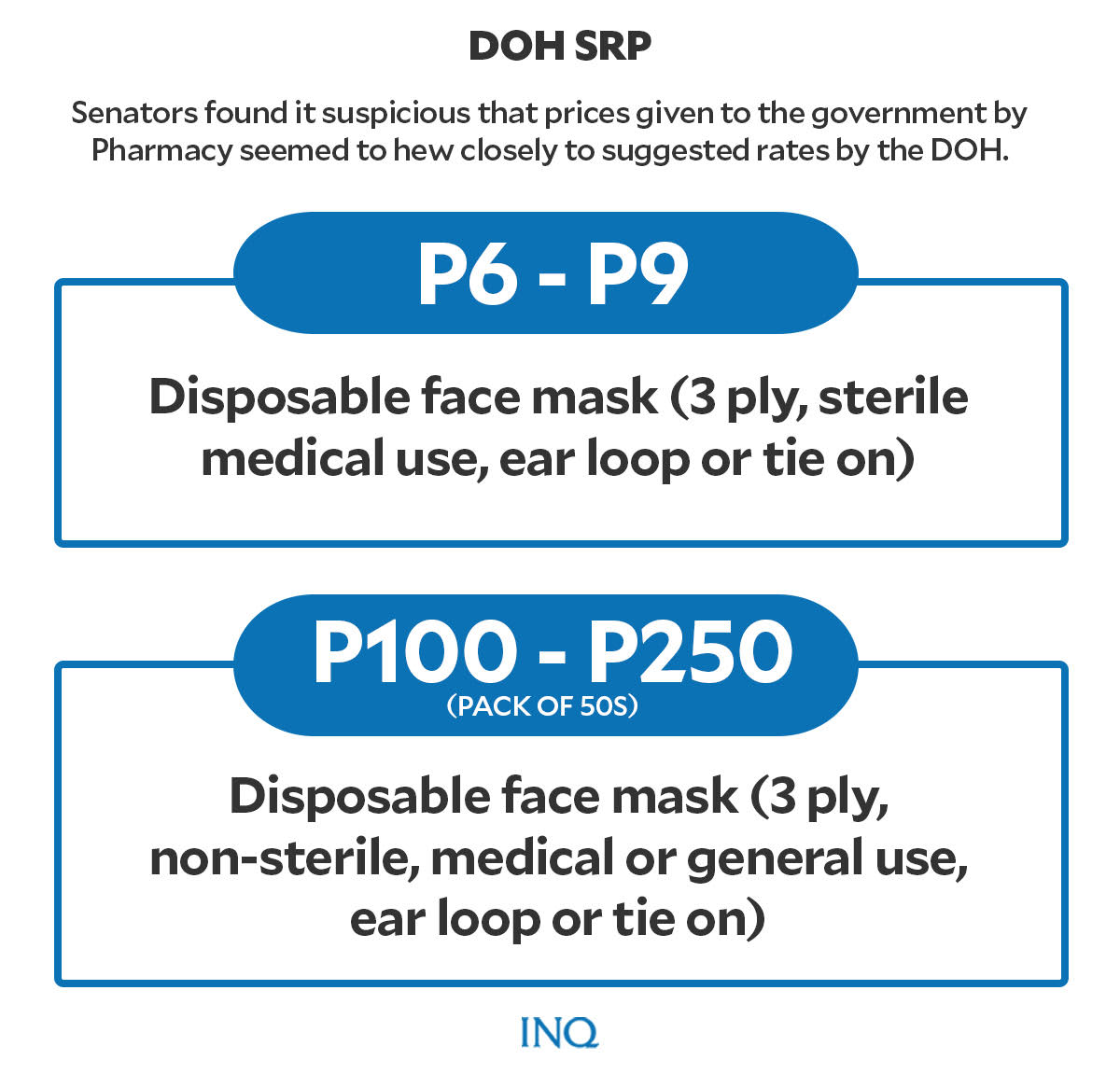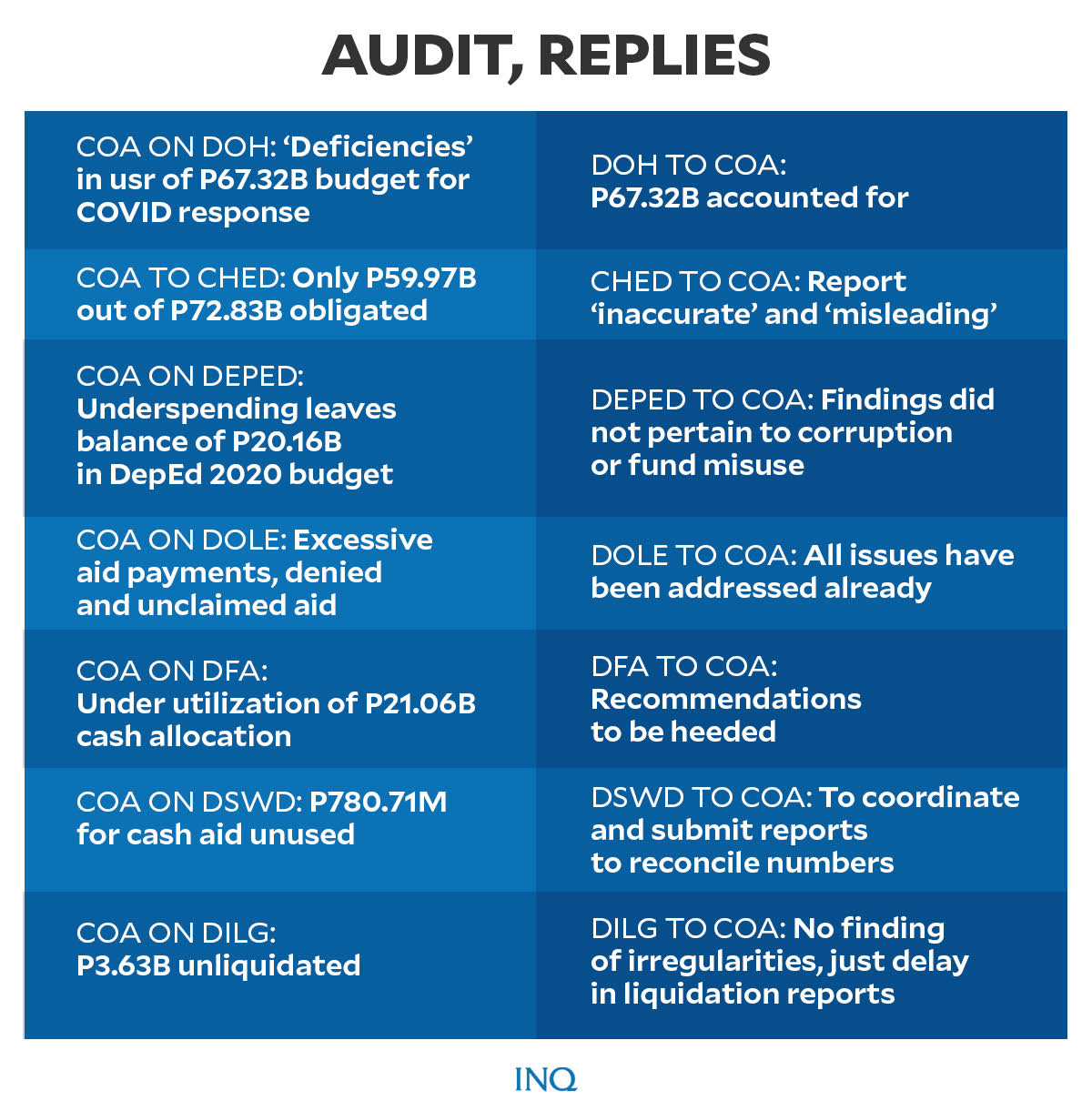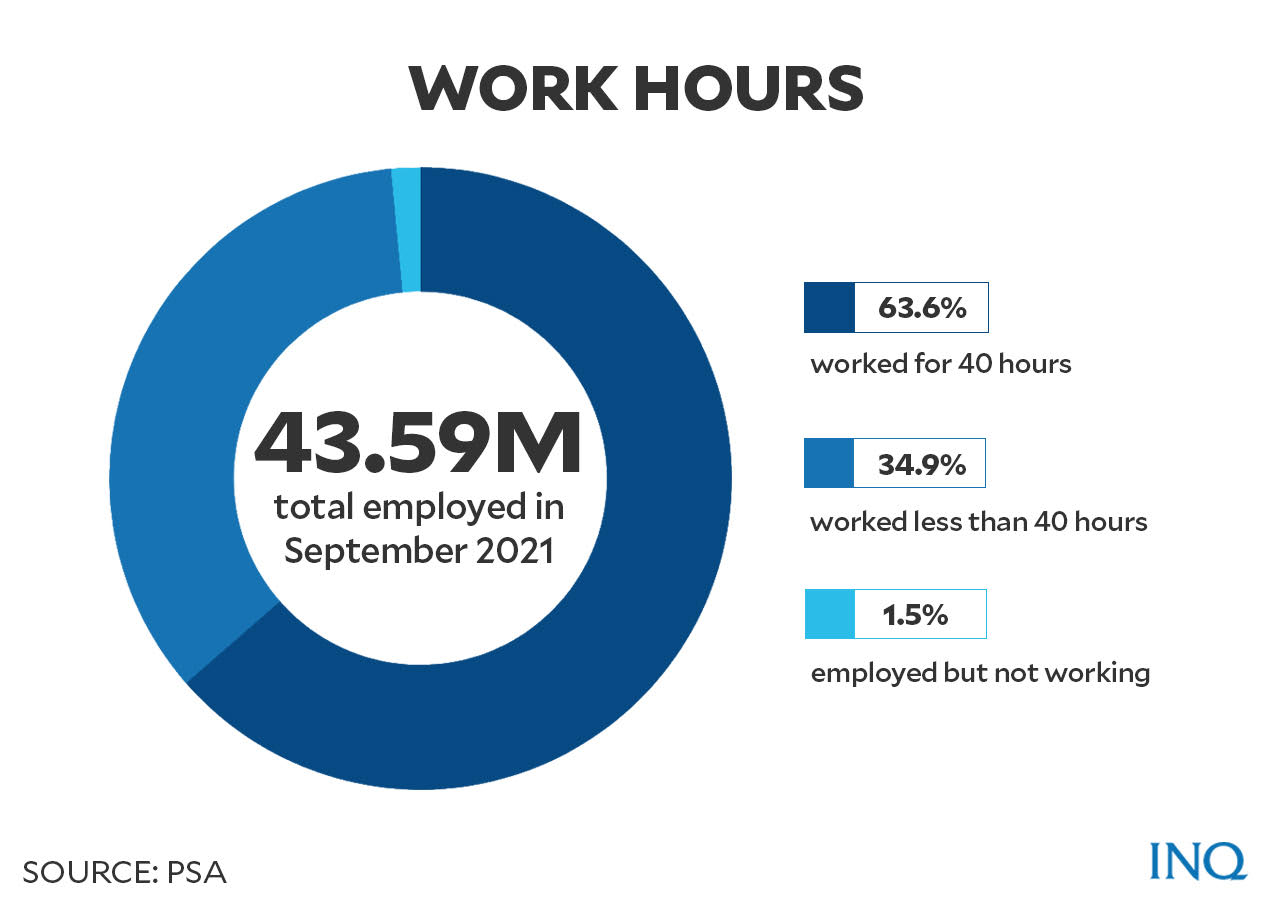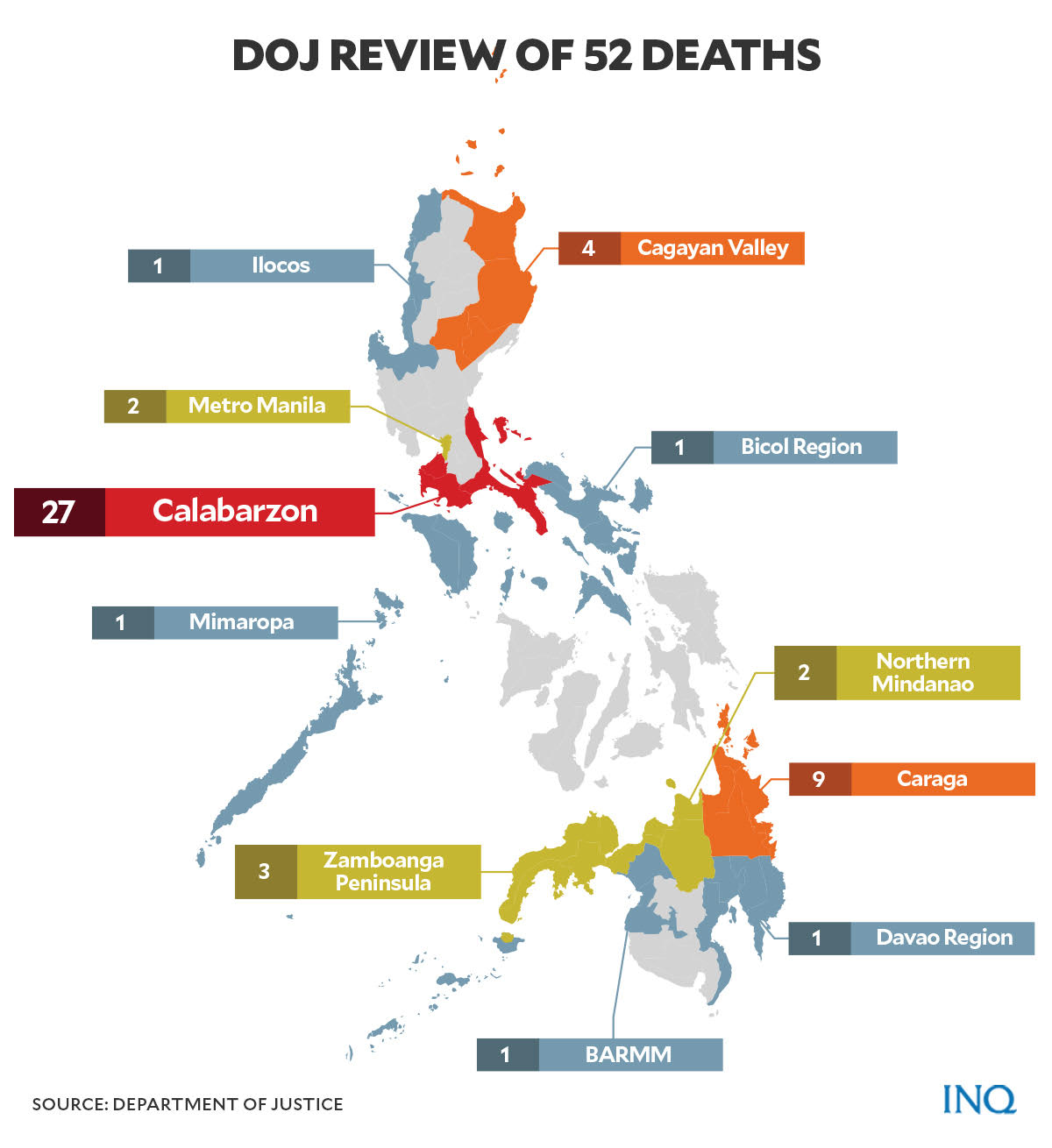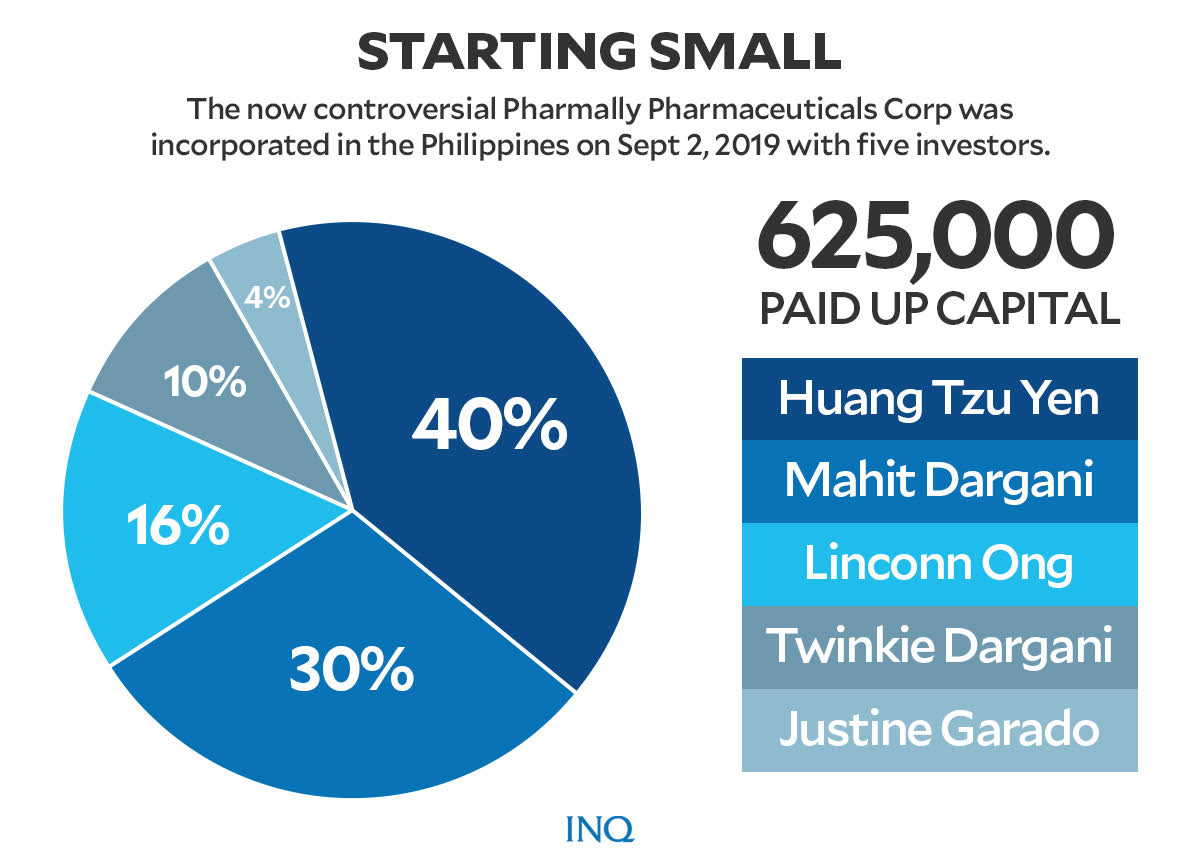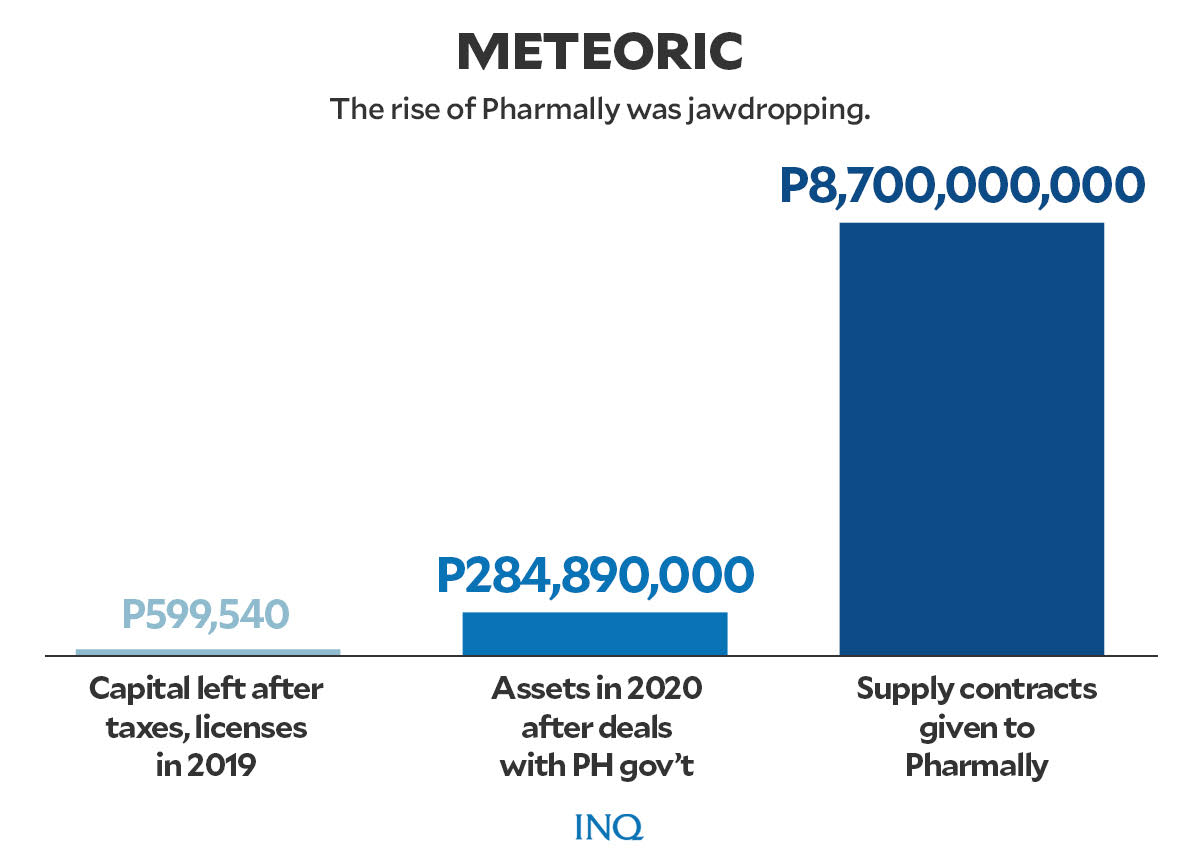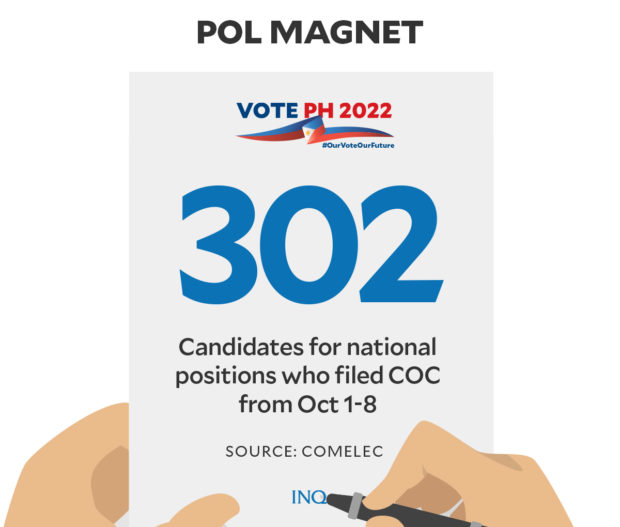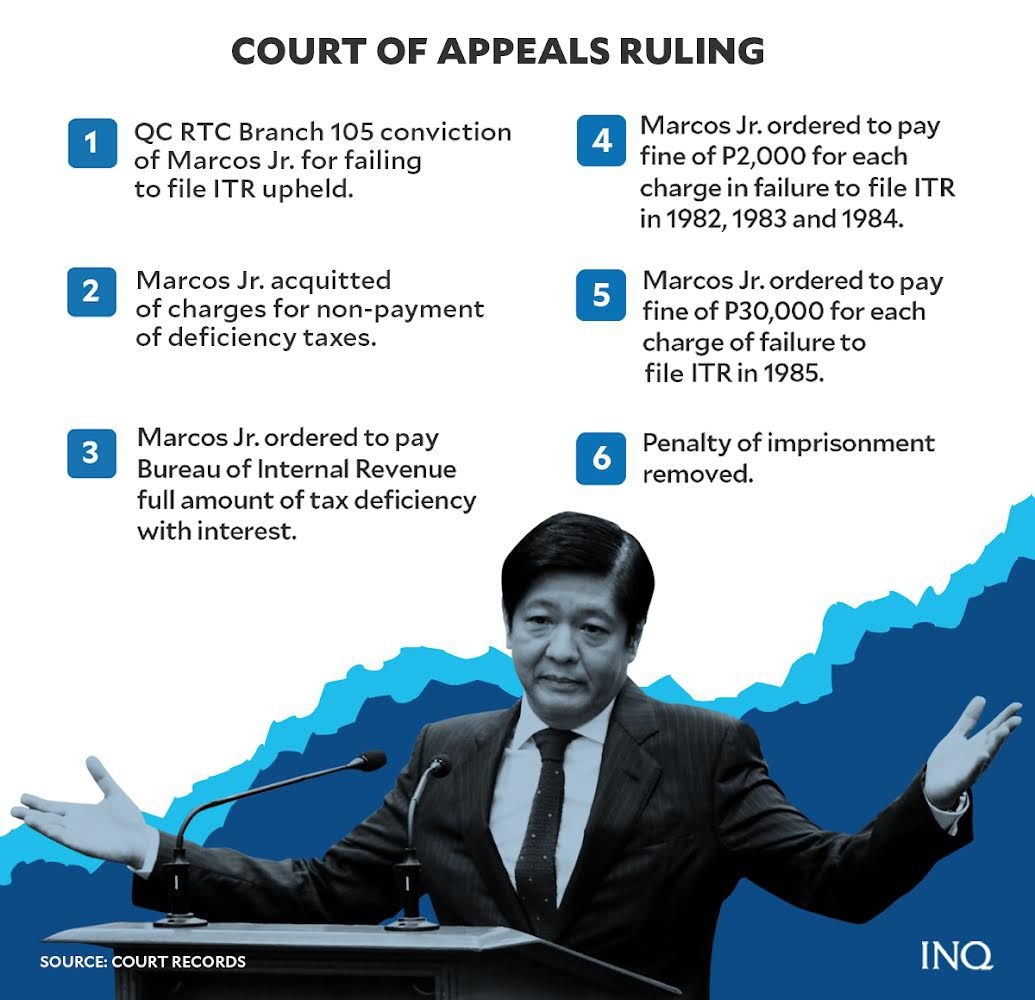A year in crisis: A review of 2021’s biggest events

MANILA, Philippines—The scenes that unfolded in 2021, which precedes a critical election year, was one in crisis despite faint silver linings on the country’s battle against COVID-19.
Ma. Ela Atienza, a political science professor of the University of the Philippines (UP) in Diliman, told INQUIRER.net that 2021 remained to be a year in crisis not only because of the continuing threat of COVID-19.
She said there’s a continuing violation of people’s rights while disasters made it even harder for people to rise from the ashes of the COVID-19 crisis and threats from the continuing mutation of the virus that causes it, SARS Cov2.
The coming elections, she said, even escalated this year’s complexity because of heightened focus on personalities with weak political coalitions, proliferation of falsehoods, divisiveness, and polarization.
Atienza, however, said there is still light in the darkness, saying that Filipinos, this year, witnessed the rise of Bayanihan spirit as the Philippines was hit with lockdowns and climate-related disasters.
She explained that 2021 saw an increased assertiveness, especially of health care workers, and a rise in exposés and investigations on corruption, especially those related to the government’s COVID-19 deals.
“Hopefully, more people will focus on these investigations, fact-checking, voter’s education, and community involvement to make certain that people will make an informed choice in the 2022 elections,” she said.
As 2021 is set to end, INQUIRER.net looks back at the highlights which defined this year. Here’s a list:
• UP-DND agreement ‘terminated’
On Jan. 15, Defense Secretary Delfin Lorenzana terminated the three-decade-old agreement between the Department of National Defense (DND) and UP which prevented the military and police from entering university grounds without coordination with school officials.
Lorenzana wrote in a letter to UP that two underground organizations—Communist Party of the Philippines and New People’s Army—were conducting “clandestine recruitment” inside campus and the agreement was being used as “shield or propaganda” to stop government operations against communist rebels inside UP.
Danilo Concepcion, president of UP, said the termination was “totally” not necessary, expressing “grave concern” over the DND decision. He said the agreement—signed on June 30, 1989 by Jose Abueva, then UP president, and Fidel Ramos, then-DND head—was ended without consultation with UP officials.
READ: DND exits deal requiring prior notice for counterinsurgency operations in UP campuses
He said the termination “may result in worsening rather than improving relations between our institutions, and detract from our common desire for peace, justice, and freedom in our society.” Concepcion explained that the DND decision could sow confusion and mistrust instead of instilling confidence in the military and police.
Last Sept. 21, with a vote of 179-0-0, the House of Representatives approved House Bill No. 10171 which aims to add the 1989 UP-DND agreement to the UP Charter. However, over a week later, Cavite Rep. Jesus Crispin Remulla said the “approval” should be reconsidered.
Remulla’s move was opposed by Makabayan lawmakers and Quezon City Rep. Jose Christopher Belmonte–the lawmakers who initiated House Bill No. 10171. The UP Board of Regents, on Nov. 4, commended the seven lawmakers as they asked to declare “null and void” Remulla’s move.
• PET dismisses Marcos Jr. case vs Robredo
Five years since Ferdinand Marcos Jr. lost the vice presidency in 2016, the Supreme Court (SC), sitting as the Presidential Electoral Tribunal, dismissed the entire election protest he filed against Vice President Leni Robredo for failing “to substantiate his allegations of massive anomalies and irregularities.”
On Feb. 16, SC spokesperson Brian Keith Hosaka said out of the 15 magistrates who were present in the session, seven fully concurred with the dismissal while eight concurred in the results. The dispositive portion of the decision said the protest was dismissed for lack of merit. Robredo’s counter-protest was likewise dismissed.
When the document was released on April 19, it was revealed that those who concurred with the dismissal were Chief Justice Alexander Gesmundo, Senior Associate Justice Estela Perlas-Bernabe, Associate Justices Alfredo Benjamin Caguioa, Ramon Paul Hernando, Rosmari Carandang, and Amy Lazaro-Javier.
Those who concurred only with the result were then-Chief Justice Diosdado Peralta, Associate Justices Henri Paul Inting, Rodil Zalameda, Mario Lopez, Edgardo delos Santos, Samuel Gaerlan, Ricardo Rosario, and Jhosep Lopez. They agreed with the main result, but not necessarily with the doctrines.
Marcos Jr. “failed to make out his case,” the SC said, explaining that there was not enough recovery of votes in the pilot provinces that he himself listed: Camarines Sur, Iloilo, and Negros Oriental. It said the “allegations appeared bare, laden with generic and repetitious allegations and lacked critical information.”
READ: TIMELINE: The 4-year Robredo-Marcos poll case
In 2016, Marcos Jr., who had 14,155,344 votes, lost to Robredo’s 14,418,817 votes. However, after the recount in the three provinces, Robredo’s lead widened by 15,093 votes–a total of 14,436,337 against Marcos Jr.’s 14,157,771. The SC said he “cannot now insist on the annulment of election results in Lanao del Sur, Maguindanao, and Basilan.”
The SC explained that if Marcos Jr. was convinced of his claim in the provinces in Mindanao, then he should have indicated those as his pilot provinces. “He did not,” it said. Marcos Jr.’s third cause of action wanted to invalidate election results in the Mindanao provinces because of alleged fraud, terrorism, and harassment.
To allow a different set of pilot provinces, the SC said, “would be to contravene the mandatory ceiling of ‘not more than three’ pilot provinces.” Rule 65 mandates a dismissal when the revision and appreciation of ballots do not back the allegations of irregularities.
On May 11, 2021, Marcos Jr. filed a motion asking the SC to reconsider its decision and conduct a new preliminary conference for his third cause of action and proceed with the presentation of evidence. However, Presidential Legal Counsel Salvador Panelo said it would be difficult to contest the decision.
• Gov’t gives COVID vaccine shots
On March 1, with 578,381 infections and 12,322 deaths, the Philippines–one of the last in Southeast Asia to do so—started giving out COVID vaccines to health care workers and government officials. Dr. Gerardo Legaspi, director of the University of the Philippines–Philippine General Hospital (UP–PGH) was the first to receive a shot.
Back then, the Philippines only had 600,000 doses of Sinovac vaccines which would only be enough to completely vaccinate 300,000 individuals. This, as the Philippines has over 1.7 million health care workers. The government likewise set a goal to vaccinate 50 million people by the end of 2021.
The Department of Health (DOH) said 756 health care workers were vaccinated on March 1: 128 from UP–PGH, 85 from Dr. Jose Rodriguez Memorial Hospital, 20 from the Lung Center of the Philippines, 110 from the Philippine National Police (PNP) General Hospital, 353 from Veterans Memorial Medical Center, and 60 from Victoriano Luna Medical Center.
Carlito Galvez Jr., head of the National Task Force Against COVID-19 and vaccine czar, said the government wanted to complete the vaccination of all health care workers in March to preserve the Philippines’ health delivery system.
He said the Philippines was set to receive 5.1 million doses of vaccines in the first three months of 2021. This included the 600,000 Sinovac doses from China. As of March 29, the Philippines had a total of 2,125,600 doses of vaccines.
Health Undersecretary Myrna Cabotaje said on March 30 that 404 health care workers have already received the second dose, explaining that the gap from first dose should be 22 to 28 days. As of March 29, 698,353 health care workers have been given their first dose of COVID-19 vaccines.
READ: The third dose: More Filipinos now marked for anti-COVID booster shots
On Dec. 24, the DOH said the government has given out 105,329,784 doses of vaccines—56,854,508 for the first dose, 47,109,449 for the second dose, and 1,365,827 for a third, or booster, dose. However, Bantay Bakuna said the government needs to give 4,449,932 doses daily to reach 70 percent herd immunity by the end of 2021.
• Rise of ‘Bayanihan’
In April, as Metro Manila, Rizal, Bulacan, Cavite, Laguna, Quirino, Abra, and Santiago City were placed by the government in a less strict form of lockdown, Ana Patricia Non, a 26-year-old graduate of UP Diliman, initiated the Maginhawa Community Pantry in Quezon City.
Non initially placed a bamboo cart filled with essential goods like vegetables, canned goods, rice, and hygiene kits on April 14. Her initiative, which immediately grew, helped residents in Quezon City, specifically in Barangays San Vicente, Sikatuna Village, Pook Marilag, and UP Campus.
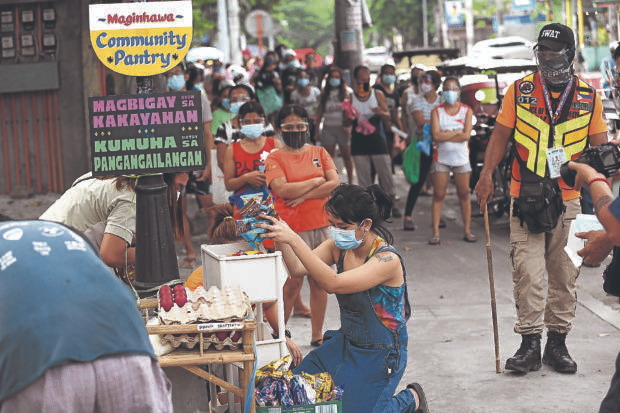
FILE PHOTO. People line up to get free food supplies at the Maginhawa community pantry in Quezon City on Saturday, April 17, 2021. INQUIRER PHOTO / NIÑO JESUS ORBETA
The initiative had this principle: “Magbigay ayon sa kakayahan, kumuha batay sa pangangailangan (Give whatever you can, take only what you need).” Non explained that it was not charity since it was reciprocal aid. “We’re all helping each other,” she said.
READ: Community pantry: ‘Not charity, but mutual aid’
In less than a week, the Maginhawa Community Pantry, which was open from 6 a.m. to 6 p.m., served 3,000 residents. Non said she was concerned for individuals hit by COVID-19 lockdowns, especially the poor who strived to make ends meet when the government imposed a two-week strict lockdown.
However, a week since the start of the initiative, Non decided to stop for a while. This, as the National Task Force to End Local Communist Armed Conflict (NTF-Elcac) shared posts alleging that the initiative was a kind of anti-government “propaganda”.
Non said she asked Quezon City Mayor Joy Belmonte for help since the police asked for her contact details and to which group she belonged. Antonio Parlade, who was NTF-Elcac spokesperson back then, likened the initiative to the work of “Satan” as he admitted that the task force profiled the individuals behind the initiative.
Despite the “red-tagging,” however, Non, which again opened the Maginhawa Community Pantry, said there were 350 similar initiatives in the Philippines. The Department of the Interior and Local Government (DILG), on May 5, said there were 6,715 initiatives.
Calabarzon, 1,766; Central Luzon, 1,407; Metro Manila, 1,229; Ilocos Region, 356; Southwestern Tagalog Region, 304; Eastern Visayas, 282; Western Visayas, 275; Bicol Region, 258; Central Visayas, 224; Davao Region, 76; Zamboanga Peninsula, 46; Northern Mindanao, 42; and Soccsksargen, 18; and Caraga Region, 18.
• ATC designates 29 individuals as ‘terrorists’
The Anti-Terrorism Council (ATC), which was created by the Anti-Terrorism Act (ATA), released on May 13 the resolution it signed on April 21 that designated Jose Maria Sison, 18 alleged leaders of the CPP, and 10 individuals who were said to be part of the Abu Sayyaf Group as “terrorists”.
Signed by Executive Secretary Salvador Medialdea and NTF-Elcac head Hermogenes Esperon Jr., the ATC designated the alleged central committee officials of the CPP and 10 leaders of the Abu Sayyaf Group as terrorists, saying it found “probable cause” as defined by the ATA to do so.
The 18 alleged CPP leaders were Vicente Ladlad, Rafael Baylosis, Jorge Madlos, Julieta Sison, Rey Casambre, Abdias Guadiana, Alan Jazmines, Benito Tiamzon, Wilma Tiamzon, Adelberto Silva, Concepcion Bocala, Dionesio Micabolo, Myrna Sularte, Tirso Alcantara, Pedro Codaste, Tomas Dominodo, Loida Magpatoc, and Menandro Villanueva.
However, the individuals, especially Ladlad who was arrested in 2018 because of cases said to be fabricated, condemned the designation. He said he strongly protested his inclusion, explaining that the designation violated his right to due process. “I was never informed by the ATC that I had been charged as a ‘terrorist’ and was never given the chance to disprove the charges,” he said.
“I firmly state that I am not a terrorist. It is the ATL in its too vague definition of terrorism and its expansive list of ‘acts of terrorism’ that enabled the authorities to easily brand my political activism as ‘terrorism’. The whole list itself is proof why the ATL should be declared as unconstitutional,” he said.
The law, which was enacted in 2020, lit fears of immense rights violations as it carried “deadly consequences”. It was highly challenged at the SC by individuals who filed petitions to declare it contrary to the Constitution. The SC ended the deliberations regarding the law in May.
The 10 leaders of the Abu Sayyaf Group who were designated as terrorists were Esmael Abdulmalik, Raden Abu, Esmael Abubakar, Muhiddin Animbang, Salahuddin Hassan, Radzmil Jannatul, Majan Sahidjuan, Faharudin Benito Hadji Satar, Mudsrimar Sawadjaan, and Almujer Yadah.
• PNoy dies
On June 24, five years since the end of his presidency, Benigno Aquino III, the 15th president of the Philippines, peacefully died in his sleep. He was brought to the Capitol Medical Center in Quezon City, but was declared dead at exactly 6:30 a.m. He was 61.
His death certificate revealed that the reason for his death was renal or kidney disease secondary to diabetes. His sister, Pinky Aquino-Abellada, said: “No words can express how broken our hearts are, and how long it will take for us to accept the reality that he is gone.”
READ: Noynoy Aquino’s rule: Numbers tell part of the story
Aquino, who was representative of the second district of Tarlac (1998 to 2007) and senator (2007 to 2010), was elected to the presidency in 2010, a year since his mother, the late former President Corazon Aquino, died of cardiorespiratory arrest due to cancer complications.
When he died, Aquino was remembered, especially by his officials when he was still in Malacañang. As they gave narratives on how Aquino worked, they said he had a tireless passion to serve Filipinos. They said the Philippines lost an “honest, principled, and uncompromising leader.”
When he was in Malacañang, the economy had its time of unprecedented growth as the gross domestic product (GDP) averaged 6.2 percent yearly. From a 3.6 percent GDP growth in 2011, it grew by 6.8 percent in 2012 and 7.8 percent in the first quarter of 2013. In 2016’s first quarter, the growth was 6.9 percent, the fastest in 11 economies in Asia.
• PH’s first ‘Olympic Gold’
Hidilyn Diaz, on July 26, the day President Rodrigo Duterte delivered his last State of the Nation Address, ended the 97-year thirst of the Philippines for an Olympic gold as she became the first Filipino to win a gold medal in the 2020 Olympics that was held in Japan.
Diaz, who was a silver medalist in the 2016 Rio Olympics and was named by Presidential Legal Counsel Salvador Panelo in a matrix that showed an alleged plan to overthrow the President, won the women’s 55-kg weightlifting competition. Her final lift, a 127-kg, has likewise set a world record.
READ: As Hidilyn’s gold shines, Panelo’s matrix wilts in the dark
She won the 55 kgs., 97 kgs., and 127 kgs. events. Because of her win, Diaz, who was once forced to seek financial help to back her Olympic bid, received rewards worth millions of pesos from the government and private companies. On Aug. 2, the cash incentives Diaz was expected to receive was over P56 million.
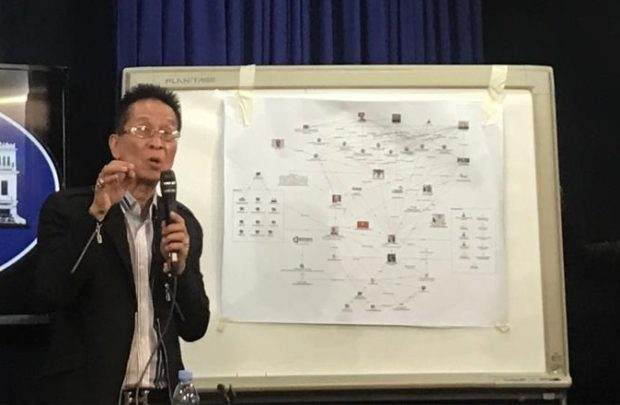
FILE PHOTO. Then chief legal counsel Salvador Panelo shows off a matrix of the supposed plot to topple President Rodrigo Duterte which included the name of Diaz.
The incentives included the P10 million provided by Republic Act 10699, the P10 million from Manny Pangilinan through the MVP Sports Foundation, the 10 million from San Miguel Corporation’s Ramon Ang, and the P5 million from Dennis Uy through his Siklab Atleta Pilipinas Sports Foundation.
Diaz was also expected to receive house and lot rewards from Century Properties, Philippine Olympic Committee president Abraham Tolentino, and Duterte. She also got a condominium unit from Megaworld Corporation, and free lifetime flights from AirAsia.
Nesthy Petecio likewise won a silver medal in women’s boxing; Carlo Paalam and Eumir Marcia won silver and bronze medals in men’s boxing. Diaz, Petecio, Paalam, and Marcial ended a 24-year thirst as Onyok Velasco, a men’s boxing silver medalist in 1996, was the last one to bring a medal for the Philippines.
• COA ‘red flags’
The Commission on Audit (COA), one of the commissions created by the 1987 Constitution, was commended by Filipinos in August for its report regarding how government offices spent resources in 2020, the year the COVID-19 crisis hit.
The reports, which were made available on the COA’s website, listed “opinions and observations” that present compliance or non-compliance of government offices with laws and regulations governing the handling of government resources which mostly come from taxpayers.
While the reports did not state that there was corruption, the COA audit showed deficiencies in the use of government resources. This immediately angered individuals who said it was a “betrayal” of millions of Filipinos still recovering from the impact of COVID-19.
The DOH was one of the agencies which the COA said had deficiencies in handling government resources. It said there were deficiencies in the handling by the DOH of P67.32 billion intended for COVID-19 response. “It cast doubts on the regularity of related transactions,” COA said.
READ: COA red flags reach nearly every corner of Duterte bureaucracy
The COA said it found irregularities in the acquisition process and lack of documentation in several contracts. At least P66.28 million was flagged because of noncompliance with laws and rules on spending. The DOH was likewise called out for P95 million in expired or expiring medicines.
However, the DOH said the P67.32 billion was all accounted for and spent on medical kits and salaries for health care workers. It said it is already addressing compliance issues and deficiencies.
Despite this and the calls for Health Secretary Francisco Duque III to resign, the President declared his belief and trust in him, saying that “even if it will bring me down, I will stand for you.”
The other government offices which the COA said had deficiencies were the Commission on Higher Education, Department of Education, DILG, Department of Labor and Employment (DOLE), and the Department of Environment and Natural Resources.
The Department of Foreign Affairs, Department of Social Welfare and Development, Department of Transportation (DOTR), Department of Energy, Land Transportation and Regulatory Board, Philippine Charity Sweepstakes Office, and the Presidential Communications Operations Office likewise had deficiencies.
• New lockdown, ‘joblessness’ rises
A strict lockdown was imposed in Metro Manila on Aug. 6 because of fears of Delta, a highly contagious variant of SARS-CoV-2 which causes COVID-19. While it was “painful,” Malacañang said the lockdown was needed to prepare for the possible rise in cases because of Delta.
The strict lockdown meant only essential establishments and industries were allowed to operate: hospitals, grocery stores, courier and delivery services, certain manufacturing firms, and business process outsourcing.
The establishments that were allowed to operate with a skeletal force were banks, veterinary clinics, telecommunications, medical clinics, power and energy, internet services, water and sanitation services, teaching establishments, and some legal services.
Malacañang said mass transport will be prohibited, however, the DOTR allowed mass transport on the condition that it should be limited to “authorized persons outside of residence (APOR)”. These restrictions were likewise imposed:
• Only take-out and delivery were allowed; no dine-in
• Only 30 percent capacity of personal care services establishments was allowed
• Only APOR can travel out of Metro Manila, Cavite, Rizal, Bulacan, and Laguna
• Indoor sports venues and tourist places were not allowed
• Only 30 percent of capacity in outdoor tourist places was allowed
• Only online gatherings were allowed
• Wakes and funerals were limited to only immediate family members
On Sept. 30, the Philippine Statistics Authority revealed that in August, joblessness increased to 8.1 percent, 1.2 percent higher than the 6.9 percent in July. This was the third highest this year since the 8.7 percent in April and 8.9 percent in September. The employment rate was 91.9 percent, lower than the 93.1 percent in July.
READ: New lockdown shuts employment door for displaced workers
Labor Undersecretary Dominique Tutay, on Aug. 6, said the strict lockdown’s impact was swift since 178 establishments already closed or cut their workforce. This, she said, displaced at least 5,322 workers.
Data from the Bureau of Local Employment of the DOLE said from Jan. to July 30, 255,714 workers had lost their work in at least 8,070 establishments. At least 6,855 of the businesses cut their workforce while 1,215 closed their doors permanently.
• ICC opens formal investigation on PH killings
The International Criminal Court (ICC), through then-chief prosecutor Fatou Bensouda, asked the pre-trial chamber to investigate the Philippines’ war on drugs and it formally opened an official investigation into crimes against humanity that were allegedly committed.
It said there was “reasonable basis” to proceed with the investigation, explaining that the “specific legal element of the crime against humanity of murder” appears to have been committed in the Philippines and that the potential case(s) arising from the investigation “appear to fall within the Court’s jurisdiction.”
The Philippine Drug Enforcement Agency said 6,215 people have been killed while 315,635 have been arrested in the government’s war on illegal drugs since July 1, 2016 to Oct. 31, 2021. Human Rights Watch, however, said the deaths could exceed 30,000.
The government reiterated that it will not cooperate with the ICC investigation, saying that the court had no “jurisdiction” over the Philippines since the government, through the President, already withdrew from the Rome Statute–the treaty that established the ICC.
Last Oct. 20, the Department of Justice released the details of its review of 52 killings in relation to the war. The details revealed that most of the cases took place in Calabarzon and Caraga Region, however, not a single case in Bulacan, the province described as the “bloodiest killing field” has been cited.
READ: PH’s ‘bloodiest killing field’ not on DOJ list of drug campaign killings
The government, on Nov. 10, asked the ICC to defer the investigation, saying that it was “investigating or has investigated with respect to the alleged crimes against humanity of murder under Article 7(1) of the Rome Statute.” The ICC agreed to suspend the investigation, but demanded proof that there was no impunity in the Philippines.
• Pharmally bags billions worth of contracts
As the COA found deficiencies on how the DOH handled its resources intended for COVID-19 response, Sen. Richard Gordon, head of the Senate blue ribbon committee, initiated a motu proprio (on its own) investigation which later revealed billions of pesos of contracts made by the government with Pharmally Pharmaceutical Corp.
The contracts had been typical, but when the Senate investigation shed light on COVID-19 deals, concerns rose: How did a barely year-old firm with a capital that is not even one percent of the amount of contracts it had with the government able to win deals with the Procurement Service of the Department of Budget and Management (PS-DBM)?
The firm, which was incorporated on Sept. 2, 2019, won 13 contracts with the government worth a total of P11 billion–all involving supplies for COVID-19 response–from March 2020 to July 2021 despite having a capital of only P625,000.
Its executives said in the hearings it didn’t have the financial capacity to procure billion-peso COVID-19 equipment so some of the firm’s officials asked Michael Yang, the President’s former economic adviser, for help.
While initially, Yang said his role was only to connect the firm with businesses from China, Huang Tzu Yen, the firm’s president, said Pharmally borrowed money from Yang to pay for the supplies that it will deliver to the government.
READ: ‘Negosyo lang’: Pharmally’s meteoric rise
This, however, was just the nature of “business,” Duterte said, explaining that the Senate has no say on the company’s technical and financial capabilities to win government contracts while in the COVID-19 crisis.
The President, insisting that there was no crime committed, declared he was ready to resign if evidence was found to link him to corrupt deals. “There was delivery, everything was complete – specifications, quality, quantity, and all. The Philippines only made payments after the delivery,” he said.
Last Nov. 29, through the arrest orders issued by Gordon and Senate President Vicente Sotto III, two of the firm’s executives, Mohit Dargani and Linconn Ong, were officially committed to the Pasay City Jail because of their refusal to cooperate with the investigation.
Ong, on Dec. 3, asked the Senate to file a case against them, saying that they “suffer” in prison even if they are not convicted criminals. The Senate earlier asked for the financial documents of the firm, however, Ong insisted he doesn’t know where the document boxes were located.
On Nov. 5, Raymond Abrea, a certified public accountant and an expert witness in the investigation, said P3.4 billion of the P7.2 billion that the firm reported as “purchases” it made as contracts to provide COVID-19 supplies could not be properly accounted for by the company because of lack of documents.
• COC filing for the 2022 elections
While the filing of certificates of candidacy (COC) for the 2022 elections went through changes because of the COVID-19 crisis, the Commission on Elections (Comelec) still saw 302 individuals who filed COC for the national elections, fewer than 321 in 2015.
The Comelec said there were 97 individuals who filed COC for president from Oct. 1 to 8. Those who want to seek the vice presidency and the Senate increased to 29 and 176. There were also 270 individuals seeking a seat in Congress through the party list system.
READ: COC filing week: The old, the new, and the future
Despite the restrictions imposed by the Comelec and the Inter-Agency Task Force for the Management of Emerging Infectious Diseases, the filing was still filled with twists like these:
• Sen. Bong Go, who said he will not seek the presidency when nominated by PDP-Laban, filed a COC for vice president.
• The President, who said he was willing to seek the vice presidency, said he will already retire from politics.
• Marcos Jr. filed a COC for president then individuals within the complex simultaneously received emergency alert SMS “BBM sa bansa, BBM sa taong bayan, BBM sa Masa. BBM Pilipinas!!!” BBM were the initials of Marcos Jr. whose nickname is Bongbong. He, however, denied allegations that his camp initiated the SMS.
• Robredo, after being silent whether she will seek the presidency or not, filed a COC for president while wearing a distinctive pink ribbon.
• Sen. Ronald “Bato” Dela Rosa, who became the standard bearer of PDP-Laban, filed a COC for president. This, however, lit speculations that he was only reserving a place for Davao City Mayor Sara Duterte.
On Dec. 23, the Comelec released its tentative list of candidates for the 2022 elections–15 for president, nine for vice president, and 70 for senators. While the Comelec previously said it will release the final list of candidates for the 2022 elections by Dec. 15, it said it needed “at least two more weeks”.
• Cases filed vs Marcos Jr.’s presidential bid
On Nov. 2, civil society leaders representing victims of the late dictator Ferdinand Marcos’ over 20-year reign, filed a petition to ask the Comelec to cancel the COC of Marcos Jr. for president because of alleged misrepresentation and disqualification as a tax law convict.
The case, filed by the leaders of Task Force Detainees of the Philippines, Kapatid, Medical Action Group, Families of Victims of Involuntary Disappearance, Philippine Alliance of Human Rights Advocates Inc., and Balay Rehabilitation Center, said Marcos Jr. “misrepresented” himself.
His COC, the petition alleged, contained “false material representation,” one of the grounds to cancel COC as stated by the Omnibus Election Code. Section 74 said that the COC “shall state that the person filing it is announcing his candidacy for the office stated therein and that he is eligible for said office.”
Marcos Jr. said he was eligible, but the petitioners said he’s not because he has a conviction for violating the National Internal Revenue Code (NIRC).
READ: 1995 tax conviction of Marcos Jr. stirs social media, again
The conviction, the petition said, became final when Marcos Jr. withdrew his petition at the SC to reverse the decision of the Court of Appeals (CA) which convicted him of non-filing of income tax returns.
While Marcos Jr.’s spokesperson, lawyer Vic Rodriguez, said the case was a “predictable nuisance,” the petitioners insisted that the NIRC stated that if the one who violated the law is a “public officer or employee, he shall be dismissed from public office and perpetually disqualified from holding any public office.”
As of Dec. 27, eight cases have been filed against Marcos Jr’s presidential bid. The last one was the petition filed by Ilocano victims of the dictatorship. Two other cases, including the one to declare him a “nuisance candidate” have already been denied.
• ‘Substitution drama’
The Comelec, in Resolution No. 10695, set Nov. 15 as the last day for substitution for the 2022 elections whether because of death, disqualification or withdrawal. As the Philippines witnessed the last days of the period to substitute, the Comelec office in Manila was filled with twists and turns.
Sara, the President’s second child who said she will seek Davao City’s highest post for the last time, withdrew her mayoral bid. With her withdrawal, Marcos Jr. declared he won’t settle for anything less than the presidency. Sara later became Lakas-CMD and Marcos Jr.’s vice presidential bet.
READ: Substitution and the political Frankenstein it created
The day Sara filed a COC, Go, who previously filed a COC for vice president, said he will run for president in the 2022 elections as the standard bearer of Partido ng Dugong Dakilang Samahan. The President, on the last day, filed a COC for senator, contrary to his previous remark that he will already retire from politics.
The President’s Senate bid likewise contradicted officials’ claims that he will seek the vice presidency as he was not aware that Sara will seek the same office. Dela Rosa, who was previously the presidential bet of PDP-Laban, withdrew his bid.
Former presidential spokesperson Harry Roque and retired PNP chief Guillermo Eleazar also filed COC for senator. The controversial Parlade, who alleged that Go is “controlling” the President, filed a COC for president. However, he did not make it to the Comelec’s tentative list.
On Dec. 14, the President and Go officially withdrew their COC for the 2022 elections.
• SC decides on the ‘terror’ law
The SC, on Dec. 9, the eve of International Human Rights Day, decided on the Anti-
Terror Act and declared it as “constitutional” except for two parts–the “qualifier” in Section 4 and a provision in Section 25.
With 12-3, the SC removed for being too broad and violative a portion of Section 4 which states that “[…]which are not intended to cause death or serious physical harm to a person, to endanger a person’s life, or to create a serious risk to public safety.”
The SC likewise struck down the second method of designating an individual as “terrorist” through the provisions of Section 25 which states that “Request for designations by other jurisdictions or supranational jurisdictions may be adopted by the ATC after determination that the proposed designee meets the criteria for designation of UNSCR No. 1373.”
RELATED STORY: ‘I don’t care about human rights’: Duterte and the failure to see human rights’ role in progress
The rest of the provisions raised in over 30 petitions against the ATL, the SC said, are constitutional. The individuals who challenged the law said several “dangerous” provisions remained, especially the one that would allow the government to imprison an alleged terrorist for up to 24 days without charges or court order.
While the SC decision to strike down two provisions was described as an “important win,” the individuals who challenged the law in 2020 said they will file a motion for reconsideration.
• Odette hits PH
As Filipinos prepared for Christmas, the Philippine Atmospheric, Geophysical and Astronomical Services Administration said on Dec. 14 that Super Typhoon Rai entered the Philippine Area of Responsibility and was named Odette.
Odette, which made nine landfalls last Dec. 16 and 17 in Surigao del Norte, Dinagat Islands, Southern Leyte, Bohol, Cebu, Negros Oriental and Palawan, carried winds of up to 230 kph. It was the Philippines’ 15th typhoon and the strongest in 2021.
READ: Super Typhoon Odette (Rai): Quick facts
The National Disaster Risk Reduction and Management Council said last Dec. 26 that Odette, which was initially considered as a Category 5 typhoon, has killed 378 individuals. It said 62 are still missing while 742 are injured.
The typhoon, the NDRRMC, left damage to agriculture worth P3,963,676,507 and damage to infrastructure worth P16,577,654,475. Over one million families, which translates to nearly four million individuals were affected by Odette.
TSB
For more news about the novel coronavirus click here.
What you need to know about Coronavirus.
For more information on COVID-19, call the DOH Hotline: (02) 86517800 local 1149/1150.
The Inquirer Foundation supports our healthcare frontliners and is still accepting cash donations to be deposited at Banco de Oro (BDO) current account #007960018860 or donate through PayMaya using this link.

